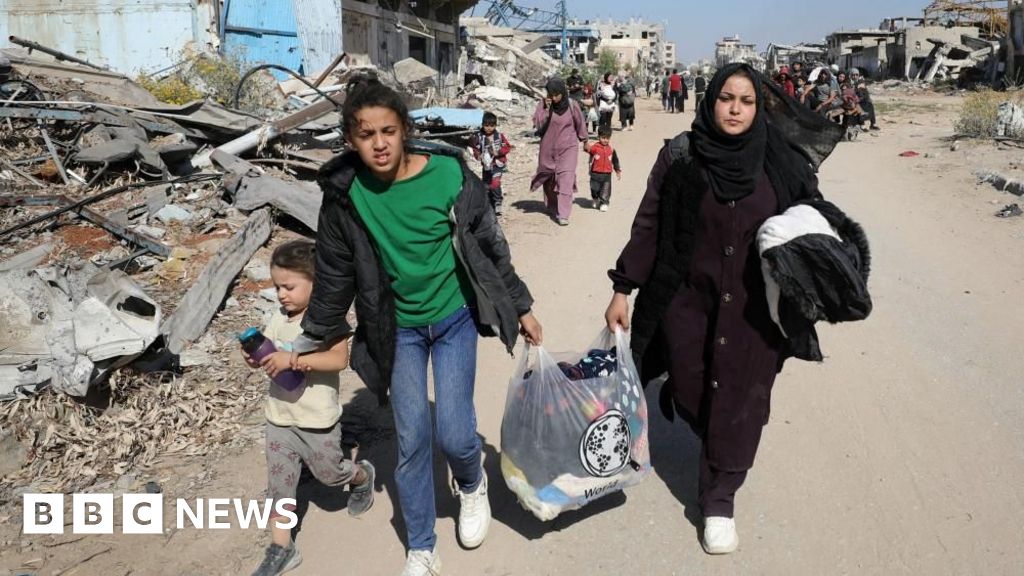Antony Blinken has told Israeli leaders that “much more needs to be done” to get humanitarian aid to civilians in besieged northern Gaza, raising possible consequences in US law if action isn’t taken, a senior Biden administration official says.
On Tuesday, the US secretary of state met Israeli Prime Minister Benjamin Netanyahu, Defence Minister Yoav Gallant, Strategic Affairs Minister Ron Dermer and senior military officials in a series of meetings in Jerusalem and Tel Aviv.
The meetings are part of a regional tour that Washington sees as a chance to revive diplomacy after Israel’s killing of Hamas leader Yahya Sinwar in Gaza last week.
The account of Blinken’s face-to-face message to the Israelis comes despite mounting criticism that the US has failed to stem the rate at which civilians have been killed in Gaza because it has been unwilling to use its supplying of weapons to Israel as leverage.
Washington has consistently rejected the criticism.
The official said Blinken also pressed the Israeli leadership over reports that its military has been implementing a so-called “generals’ plan” in northern Gaza – a tactic described as using mass forced displacement of civilians and a surrender-or-starve tactic against all who remain.
The official said the Israelis told them the tactic was “absolutely not” their policy, to which the Americans responded that their Israeli counterparts then needed to make this clearer publicly.
Israel has said its offensive in northern Gaza is to rout a Hamas resurgence.
Blinken’s apparent warning on humanitarian aid followed his letter last week, co-signed by US Defence Secretary Lloyd Austin, which gave the Israeli government 30 days to surge aid into the northern Gaza Strip or risk having some military assistance cut off.
“There was extended conversation about this,” the senior State Department official said.
They added: “The steps that have [been] taken thus far have not been sufficient and we made that clear today, that we do need to see more.”
“We have seen some initial progress. We heard more from Minister Gallant in detail about… steps that he is overseeing to be responsive to it, but… both with the prime minister, Minister Dermer and with Minister Gallant, this was a central part of the discussion,” said the official, who spoke on condition of anonymity.
Aid groups have warned that civilians in northern Gaza risk starvation amid Israel’s military siege.
Israel says its offensive there is focused on Hamas fighters, while the US has warned it not to try to forcibly displace residents to the south of Gaza, where 1.7 million civilians are crammed into a dangerously overcrowded area at “lethal risk” of disease.
Pressed on whether Blinken warned the Israelis verbally about repercussions if Israel didn’t heed its demands, the official said Blinken “made clear it has implications under our law and policy, [and] what those actions need to be”.
A statement issued by Netanyahu’s office after the meeting made no mention of humanitarian assistance. It stressed the “Iranian threat” against Israel and the need for the US and Israel to “unite” against it.
The statement also said Blinken had expressed America’s “deep shock” over what Israel says was an Iranian assassination attempt against Netanyahu via a Hezbollah drone strike on his private residence at the weekend.
It said Blinken had characterised the event as “an exceptionally extreme incident”.
Asked whether this account was accurate, the US official said Blinken “expressed concern that it was a very serious incident… ‘Exceptional and extreme’ is not language that he would typically use.”
The official added the US had no assessment either way over the claim of Iranian involvement.
The discrepancy in the characterisation of their conversation comes with Israel poised to carry out a retaliatory strike against Iran for its 1 October ballistic missile attack on Israel. That had followed Israel’s recent assassination of Hezbollah leader Hassan Nasrallah in Beirut and Hamas political leader Ismail Haniyeh in Tehran.
The US is attempting to get Israel to dial down the scale of its response for fear of further regional escalation.
The US official also said Blinken discussed the war between Israel and Hezbollah in Lebanon as part of a “diplomatic push” the Americans are making to de-escalate the fighting, but didn’t provide any update on whether this had made progress.

